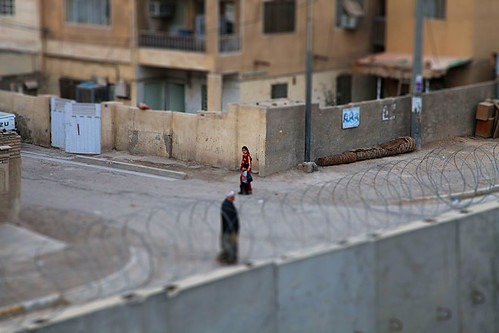
Just to be absolutely clear, I was only in Baghdad for a week, more than a year ago. A cushy week, at that, where I stayed in our compound, ate freshly-baked pastries, and asked the Iraq team a lot of questions about their work. I left the compound once to go to the green zone. We went directly back afterward. I had no close calls, no kidnap attempts, and no experience with live fire of any kind. I saw Baghdad through the window of our battered Mercedes and briefly from the roof of our apartment building.
I know an awful lot of people who’ve been to Iraq. Just about everyone at IMC, for one thing. My friend Kerry, for another. A monitoring and evacuation specialist who got sent home because it was too dangerous for non-permanent staff. My cousin, a Kuwaiti, who translated for UPI. A contractor who carried a secret gun so that “he wouldn’t end up in a video in CNN.” I am not trying to say I have anything in common with them.
I’ve just got me, and my experience. I went to Baghdad, I ate a lot of carbs, I listened to a lot of music on my laptop to drown out the explosions I could always hear in the distance. I was there the week the surge started and the Iranian ambassador was taken. I heard two bazaar bombings. I discovered mortar fire sounds just exactly like it does on M*A*S*H (the mortar fire is much louder near the green zone).
I remember every tiny detail of that trip. What the detergent in the sheets smelled like. The flavor and texture of the little cookies the cook made. And the music I played. One song in particular, I listened to many, many times. Love is the Movement. I’ve got it on my iPod. I still love the song, but it gives me nightmares. I flinch when I see it on my playlist, and I always listen to it anyway.
Iraq was real. We were doing work that really, really mattered there, and it was some of the best work that can be done in Iraq. If we hadn’t been doing it, no one else could have. (You don’t, honestly, feel that way all that often. Usually you know that if you don’t do it, World Vision or CARE probably will.) I talked to my colleagues in that office – who were, to a person, traumatized and shell-shocked – and they were utterly committed to what they did. They knew their work had damaged them and they thought it was worth the trade-off.
If I didn’t have my son, I’d still be in that office today.
I heard Love is the Movement on my bus ride home. I donated some money to my former employer this evening, and I did the thing I hate and designated it for Iraq programs. I’m going to wake up crying tonight.


